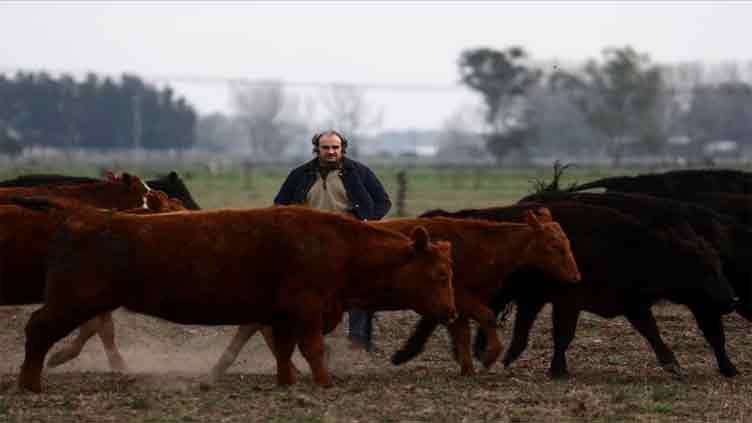Argentine farmers back conservatives in election, hoping for freer markets

Business
The South American country will vote in open primary elections on Sunday
SAN VICENTE (Reuters) – In Argentina's grains fields and cattle ranches, farmers are hoping upcoming elections will bring political change and an end to years of economic uncertainty, ushering in freer markets with fewer currency controls and export limits.
The South American country will vote in open primary elections on Sunday that will give an indication of how general elections in October will go. The ruling Peronist coalition is facing a strong challenge by the conservative opposition.
The government, battling an acute shortage of dollars, annual inflation scraping 116 per cent, and a fast declining currency, has imposed strict capital controls, limited some exports, and hiked interest rates to 97pc. That has made business difficult in one of the world's top soyoil and meal exporters and No 3 corn exporter.
"It's been a tough time for the farm sector and we hope there will be a change to boost production," Horacio Deciancio, 71, a rancher and head of farming town San Vicente's local agricultural group, told Reuters from his fields, surrounded by cows.
Like many farmers he opposes the Peronists, who the industry has long clashed with over taxes and export controls, and favoured the main opposition bloc Together for Change, which has a slight lead in opinion polls.
"At least what they are talking about in the political campaign would improve conditions for the sector," he said.
Competing to lead the Together for Change coalition are Buenos Aires city mayor Horacio Larreta and ex-security minister Patricia Bullrich, taking on the Peronist front-runner Sergio Massa, the current Minister of Economy.
Larreta and Bullrich have both pledged to remove taxes and limits on exports of agricultural products, as well as eliminate caps on exchange and capital markets, diverging only on how fast those controls could be unwound.
"I think Larreta could be a good candidate for what he's promising," said Juan Carlos Ardohain in a field he rents in San Vicente for cattle. Currency exchange instability in recent years had inflated his costs, he said.
Argentina's currency controls, which tightly limit access to dollars, have stoked a flourishing black market for foreign currency where greenbacks command over twice the official price, distorting import and export markets.
Many farmers, or "chacareros", from the wide Pampean plains, the engine room of Argentina's economy, say they will get behind the conservative opposition as they did in 2015, when they helped propel former President Mauricio Macri to power.
"What we need are free markets," Ricardo Firpo, an agricultural producer from the breadbasket province of Santa Fe, said at the annual fair of the Argentine Rural Society (SRA) in capital Buenos Aires.
"We need to be able to export what is needed, to work freely, to be able to bring in and withdraw foreign currency, a single exchange rate, lower interest rates," he said.
At a recent event, the head of the powerful SRA chamber sat next to Larreta in a show of support and warned that the farming sector was in jeopardy due to what he called mismanagement of the economy by the Peronist administration.
The government blames the country's economic woes on issues they inherited, as well as the impact of the Ukraine war and a record drought. Massa has promised to steady the economy, but his policies have not directly addressed the farming sector, with whom the Peronists have long had a mutual antagonism.
"We think the farm sector can give much more than it is doing now," farmer Deciancio said.
"But if they put their foot on our head, as is happening now, the sector will not be able to come up to breathe."

